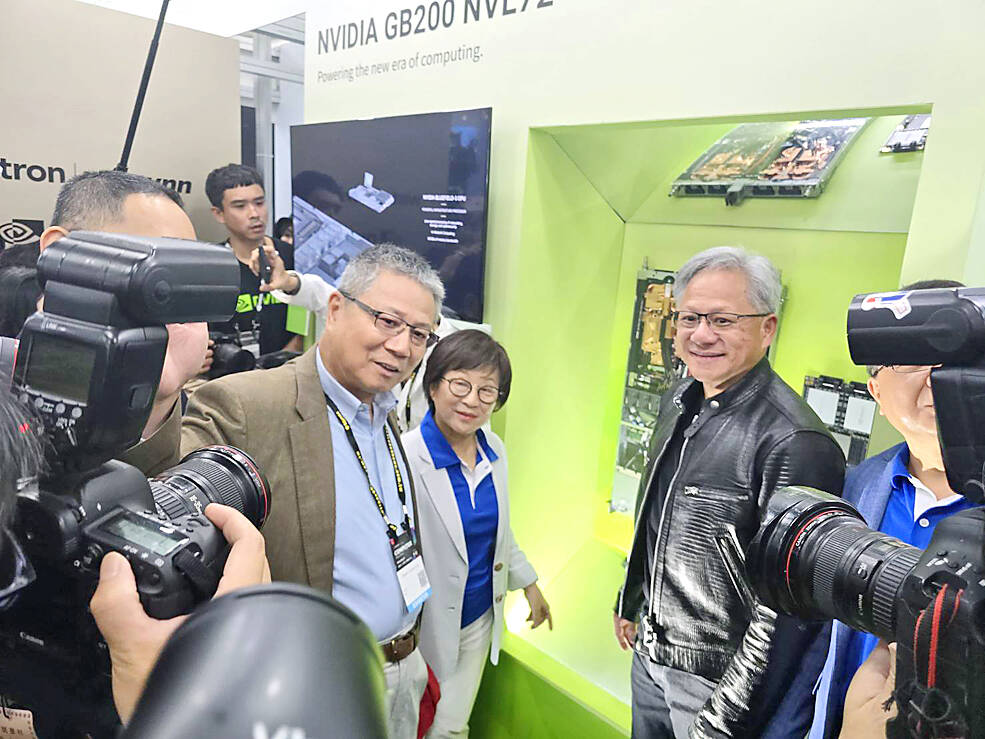Wiwynn Corp (緯穎), a supplier of artificial intelligence (AI) servers and components, on Thursday said that it plans to invest US$300 million to build its first manufacturing facility in Texas to cope with the realignment of global supply chains amid escalating macroeconomic uncertainty.
Wiwynn operates manufacturing facilities in Taiwan, Mexico and Malaysia. The Texas factory plan came as US President Donald Trump said that sweeping tariffs of 25 percent on Mexican and Canadian imports would take effect on March 4.
Domestically, Wiwynn is also increasing its capacity. The company on Thursday raised capital expenditures by about 29 percent for its new manufacturing facility and office building at the Southern Science Park to NT$8 billion (US$243.8 million), higher than an earlier estimate of NT$6.2 billion.

Photo: CNA
The new investment would further strengthen the company’s global production footprint and expand its scope of delivery, the company said.
Wiwynn counts US cloud services providers Meta Platforms Inc and Microsoft Corp among its major clients.
“The company is optimistic about data center long-term market demand and growth, and is committed to continuous investments to deepen AI, computing, thermal, and technologies and product development,” Wiwynn said. “The company will also flexibly adjust the global capacity allocation to respond to political and economic dynamics, and customer demand.”
Wiwynn on Thursday posted the strongest quarterly net profit in the company’s history last quarter, amounting NT$7.05 billion, benefiting from strong demand for regular and AI-enabled servers.
That means last quarter’s net profits had doubled from NT$3.51 billion in the fourth quarter of 2023. Earnings per share soared from NT$20.1 a year ago to NT$37.9 last quarter.
The company previously told investors that AI servers accounted for about half of its total revenue in the final quarter of last year, compared with about 20 percent in the first quarter. Revenue last quarter surged 97.5 percent year-on-year to NT$115.61 billion.
Last year as a whole, Wiwynn’s net profits surged 89 percent year-on-year to NT$22.78 billion compared with NT$12.04 billion in 2023. EPS climbed from NT$68.88 to NT$126.57.
Gross margin improved from 9.37 percent in 2023 to 10.37 percent last year, while revenue hit a record high after rising 49 percent from NT$241.90 billion to NT$360.54 billion last year.
The company’s board of directors on Thursday approved a cash dividend distribution of NT$74 per common share, setting an all-time high. That represented a payout ratio of 58.47 percent.

South Korea’s equity benchmark yesterday crossed a new milestone just a month after surpassing the once-unthinkable 5,000 mark as surging global memory demand powers the country’s biggest chipmakers. The KOSPI advanced as much as 2.6 percent to a record 6,123, with Samsung Electronics Co and SK Hynix Inc each gaining more than 2 percent. With the benchmark now up 45 percent this year, South Korea’s stock market capitalization has also moved past France’s, following last month’s overtaking of Germany’s. Long overlooked by foreign funds, despite being undervalued, South Korean stocks have now emerged as clear winners in the global market. The so-called “artificial intelligence

NEW IDENTITY: Known for its software, India has expanded into hardware, with its semiconductor industry growing from US$38bn in 2023 to US$45bn to US$50bn India on Saturday inaugurated its first semiconductor assembly and test facility, a milestone in the government’s push to reduce dependence on foreign chipmakers and stake a claim in a sector dominated by China. Indian Prime Minister Narendra Modi opened US firm Micron Technology Inc’s semiconductor assembly, test and packaging unit in his home state of Gujarat, hailing the “dawn of a new era” for India’s technology ambitions. “When young Indians look back in the future, they will see this decade as the turning point in our tech future,” Modi told the event, which was broadcast on his YouTube channel. The plant would convert

‘SEISMIC SHIFT’: The researcher forecast there would be about 1.1 billion mobile shipments this year, down from 1.26 billion the prior year and erasing years of gains The global smartphone market is expected to contract 12.9 percent this year due to the unprecedented memorychip shortage, marking “a crisis like no other,” researcher International Data Corp (IDC) said. The new forecast, a dramatic revision down from earlier estimates, gives the latest accounting of the ongoing memory crunch that is affecting every corner of the electronics industry. The demand for advanced memory to power artificial intelligence (AI) tasks has drained global supply until well into next year and jeopardizes the business model of many smartphone makers. IDC forecast about 1.1 billion mobile shipments this year, down from 1.26 billion the prior

People stand in a Pokemon store in Tokyo on Thursday. One of the world highest-grossing franchises is celebrated its 30th anniversary yesterday.